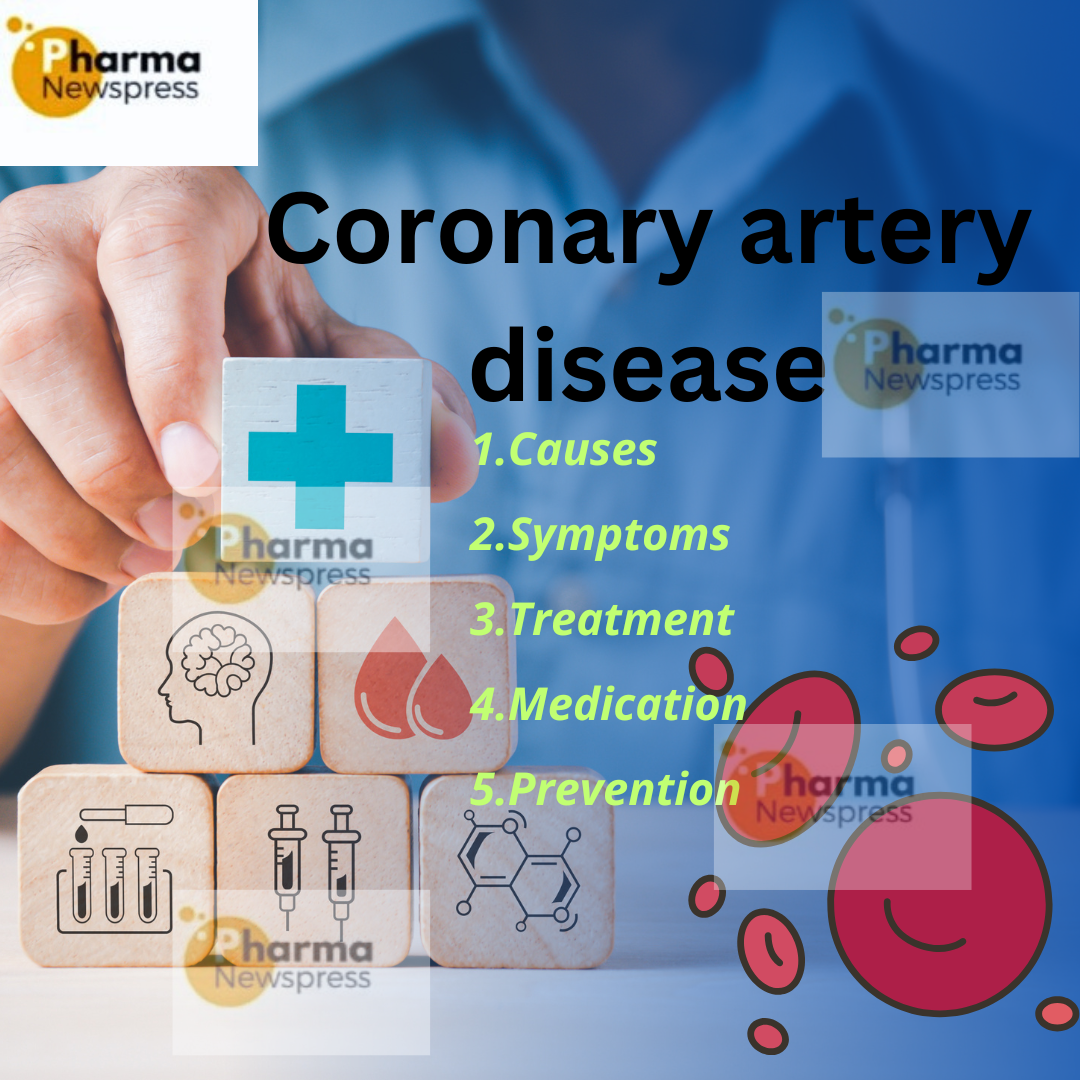The coronary arteries are the blood vessels that supply oxygen-rich blood to the heart muscle itself. These arteries are crucial for maintaining the heart’s function, as they deliver the necessary oxygen and nutrients the heart needs to pump blood throughout the body.
CAUSES
🔸The primary cause of CAD is atherosclerosis, which develops due to:
🔸High levels of LDL cholesterol.
🔸High blood pressure.
🔸Smoking.
🔸Diabetes or insulin resistance.
🔸Sedentary lifestyle.
🔸Obesity.
🔸Unhealthy diet (high in trans fats, salt, and sugar).
SYMPTOMS
The symptoms of coronary artery disease (CAD) can vary depending on the severity of the blockage in the coronary arteries. In some cases, people may have no symptoms until they experience a major event, such as a heart attack. Common symptoms include:
1. Chest Pain or Discomfort (Angina)
✳️A feeling of pressure, tightness, squeezing, or heaviness in the chest.
✳️Often triggered by physical activity, stress, or heavy meals.
✳️Typically lasts a few minutes and improves with rest or nitroglycerin.
✳️Pain may radiate to the arms, neck, jaw, shoulder, or back.
2. Shortness of Breath
✳️Occurs when the heart cannot pump enough blood to meet the body’s oxygen demands.
✳️May happen during physical activity or even at rest in advanced cases.
3. Fatigue
✳️Feeling unusually tired, especially during physical activities, due to reduced oxygen supply to the heart and body.
4. Heart Attack (Myocardial Infarction) Symptoms
✳️Severe or prolonged chest pain that may not improve with rest.
✳️Pain that spreads to the arm, neck, back, or jaw.
✳️Nausea or vomiting.
✳️Sweating (cold sweat).
✳️Dizziness or fainting.
✳️Difficulty breathing.
5. Silent Ischemia
✳️In some cases, CAD can be asymptomatic (no noticeable symptoms), especially in people with diabetes. This is known as silent ischemia and can still lead to significant heart damage.
6. Other Symptoms
✳️Palpitations or irregular heartbeats.
✳️Swelling in the legs or feet (in severe cases of heart failure due to CAD).
✳️If you suspect symptoms of CAD, particularly chest pain or shortness of breath, consult a healthcare professional immediately. If a heart attack is suspected, seek emergency medical help.
TREATMENT
Treatment of coronary artery disease (CAD) without medication focuses on lifestyle changes and interventions that can help improve heart health, reduce risk factors, and manage symptoms. These approaches are typically used in conjunction with medical treatments, but they can also be effective on their own for mild cases. Here are some key strategies:
1. Dietary Changes:
Adopt a heart-healthy diet, such as the Mediterranean diet or DASH (Dietary Approaches to Stop Hypertension), which emphasizes fruits, vegetables, whole grains, lean proteins (especially fish), nuts, seeds, and healthy fats (like olive oil).
Limit saturated fats, trans fats, cholesterol, and processed foods.
Reduce salt intake to lower blood pressure.
2. Exercise:
Regular physical activity, like walking, cycling, or swimming, can improve cardiovascular health, help maintain a healthy weight, and reduce stress.
Aim for at least 30 minutes of moderate exercise most days of the week.
3. Weight Management:
Maintaining a healthy weight can reduce the strain on your heart and improve risk factors like blood pressure, cholesterol, and blood sugar levels.
4. Smoking Cessation:
Quitting smoking is one of the most significant actions to improve heart health. Smoking accelerates the development of plaque in the arteries and contributes to the narrowing of blood vessels.
5. Stress Management:
Chronic stress can negatively impact heart health. Practicing relaxation techniques like yoga, meditation, deep breathing, or progressive muscle relaxation can help reduce stress levels.
6. Regular Monitoring:
Keeping track of blood pressure, cholesterol levels, and blood sugar helps identify risk factors early on and can guide lifestyle adjustments.
7. Alternative Therapies:
Some people explore non-medication options like acupuncture, herbal remedies, or supplements. However, these should only be used under the guidance of a healthcare provider, as they may not be effective for everyone or may interfere with other treatments.
Medications
🔸Antiplatelets (e.g., Aspirin, Clopidogrel): Prevent blood clots.
🔸Statins (e.g., Atorvastatin, Rosuvastatin): Lower cholesterol levels and slow plaque buildup.
🔸Beta-Blockers (e.g., Metoprolol, Atenolol): Reduce heart rate and blood pressure, relieving angina.
🔸ACE Inhibitors (e.g., Enalapril, Lisinopril) or ARBs: Lower blood pressure and protect the heart.
🔸Calcium Channel Blockers (e.g., Amlodipine): Improve blood flow by relaxing coronary arteries.
🔸Nitrates (e.g., Nitroglycerin): Relieve chest pain by dilating blood vessels.
🔸Diabetes Medications: If diabetes is present, good glucose control is crucial.
🔸Anticoagulants (e.g., Warfarin, DOACs): In some cases, blood thinners may be prescribed to prevent clots.
Prevention
1. Healthy Lifestyle: Adopting a heart-healthy diet, regular physical activity, quitting smoking, and managing stress helps reduce the risk of CAD.
2. Control Risk Factors: Managing high blood pressure, high cholesterol, and diabetes through medication and lifestyle changes significantly lowers CAD risk.
3. Regular Health Check-ups: Monitoring blood pressure, cholesterol levels, and blood sugar helps in early detection and management of risk factors, preventing the onset of CAD.


